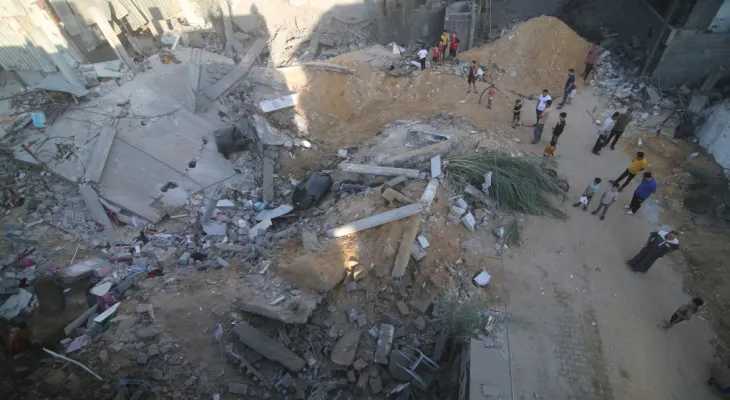Search here
Newspaper
Search here

Arab Canada News
News

Published: October 16, 2023
The largest UN relief agency, UNRWA, operating on the ground in Gaza, said on Sunday it is unable to continue providing humanitarian assistance as approximately one million residents of northern Gaza struggle to flee south or find shelter ahead of an imminent ground attack from Israel.
The UNRWA Commissioner said, "I have called this press conference to sound the alarm that as of today, my colleagues at UNRWA (the United Nations Relief and Works Agency for Palestine Refugees in the Near East) in Gaza are no longer able to deliver humanitarian assistance."
General Philippe Lazzarini said, "As I speak to you, Gaza is running out of water and electricity. In fact, Gaza is being suffocated, and it seems that the world has now lost its humanity."
This statement comes after reports of water shortages in many UN shelters, and Israel cut off water, food, fuel, and electricity to the Gaza Strip earlier in the week following Hamas's devastating attack on October 7, which resulted in the death of over 1,400 Israelis, mostly civilians, while Hamas took approximately 150 hostages.
In the days following the attack, Israel bombarded Gaza with airstrikes. More than 2,600 Palestinians have been killed and 9,600 injured, according to the Gaza health ministry.
UNRWA, the United Nations agency for Palestinian refugees, operates temporary shelters outside of the schools it manages to assist those seeking safety or whose homes have already been destroyed by airstrikes from Israel. The agency also runs 22 health centers and 14 food distribution centers, but many health centers had to close last week, and all food distribution centers have been closed since October 7, leaving nearly half a million people without services, along with their food rations.
Lazzarini stated, "Not a single drop of water, nor a single grain of wheat, nor a liter of fuel has been allowed into the Gaza Strip in the past eight days."
"The number of people seeking shelter in our schools and other UNRWA facilities in the south is overwhelming, and we no longer have the capacity to cope with them."
More than 400,000 internally displaced persons in Gaza have sought refuge in UNRWA schools and shelters so far.
Lazzarini added that 14 UNRWA staff were killed last week, including teachers, engineers, guards, psychologists, an engineer, and a gynecologist, stating, "Most of UNRWA's 13,000 staff in Gaza have now become displaced or have left their homes."
In a video shared with X on Sunday, a UNRWA worker stationed at a center in Khan Younis city said that 15,000 Palestinian refugees had come to this center alone.
Rawya Halas said in the video: “They left their homes, without food or drink, diabetic patients, children, and even the disabled and infants, some children have contracted chickenpox.” She added that "the center cannot accommodate this number in terms of food, bathrooms, water, or electricity."
She pleaded while crying, saying: "Please save Gaza. It's dying, it's dying, it's dying."
Israel ordered residents in northern Gaza to evacuate ahead of the expected ground invasion on Friday, prompting millions to flee. Others, unable to evacuate, sought refuge in hospitals in the north, where staff are still trying to care for patients who cannot be moved.
UNRWA stated in a press release on Saturday urging Israeli authorities to protect civilians that "Wars have rules. Civilians, hospitals, schools, clinics, and UN buildings cannot be a target." "UNRWA spares no effort in calling on the parties to the conflict to meet their obligations under international law to protect civilians, including those seeking shelter in UNRWA shelters."
It added that "UNRWA shelters in Gaza and northern Gaza are no longer safe. This is unprecedented."
UNRWA calls on Israel to allow fuel into the area so that the water station and desalination plant in southern Gaza can operate again.
Lazzarini said on Sunday, “Unfortunately, we still have a fuel shortage,” adding, "All parties must facilitate the humanitarian corridor so we can reach all those in need of assistance."
U.S. National Security Advisor Jake Sullivan told CNN on Sunday that Israeli officials informed him of plans to restore water in southern Gaza. Israeli Energy and Water Ministry spokesperson Adir Dahan stated that water had been restored at one location in southern Gaza, but relief workers say they have seen no evidence of water flowing anywhere in the region.
The WHO regional director has called on Egypt to reopen the Rafah border crossing to allow medical supplies and humanitarian aid into Gaza. The crossing, the only way out of the besieged area, was closed on Tuesday after Israeli airstrikes targeted areas near the Gaza side of the crossing.
Lazzarini stated that unless new supplies are brought into Gaza, relief workers will not be able to continue their operations.
Lazzarini mentioned that the humanitarian situation in Gaza has been a problem for decades, as the impoverished area with a population of 2.3 million has relied on international aid long before the recent escalation of hostilities. Gaza has been under siege since 2007, when Hamas took control. Canada has designated Hamas a terrorist organization.
Lazzarini explained, "Before the war, Gaza had been under siege for 16 years, and more than 60% of the population was already dependent on international food assistance. "It was already, before the war, a humanitarian care community."
However, he noted that hindering relief efforts in the region to this extent is "unprecedented."
He added, "The attack last week on Israel was horrific, and the devastating images and testimonies keep emerging. "The attack and hostage-taking represent a flagrant violation of international humanitarian law. But the response to the killing of civilians cannot be to kill more civilians."
Comments